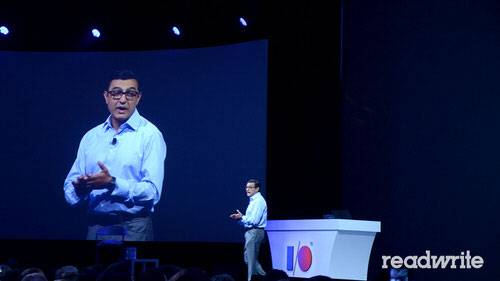
In San Francisco Wednesday, Google just kicked off I/O, its annual conference for developers with the audiovisual bombast that’s customary at these sorts of events. But underneath the music, behind the pulsing screens, a question lurked: What does it mean to be a “developer”? Who is Google speaking to?
I’d argue that the definition of “developer” is expanding to embrace a larger and larger set of people, people who previously thought of themselves merely as technology enthusiasts or heavy users of technology at home and in the workplace. And Google is at the forefront of pushing this redefinition.
Google executives Vic Gundotra and Sundar Pichai hinted at the expansiveness of I/O’s reach. We’ve heard that some 7,500 developers are registered for this year’s event. Gundotra, a longtime champion of developers at Google, noted that 1 million people were watching the live stream. (That’s him in the image above.) And Pichai hinted at the explosion of post-PC, post-smartphone, post-tablet devices for which we might build experiences soon: Google Glass, smart watches, and other wearable-computing gadgets.
It’s All About The Tools
A software developer, in the Microsoft era, was someone who wrote applications for a desktop PC.
Now, we get computing devices through an explosion of screens, from TVs to big monitors on our desktops to tablets and smartphones. Google Glass and the Pebble smart watch give us even smaller screens—just enough room for blips of information. There are simply too many ways of delivering digital experiences for anyone to dedicate developers to each one.
That means that we need more and more layers of abstraction around the development of software. At I/O, Google showed off one such tool, called Android Studio, which aims to simplify the frustrating process of figuring out what screen an Android user might have. It was launched to big applause.
A new developer console for Google Play, Google’s store for Android apps, tells developers when they’re getting a lot of users in a specific country—and even offers a translation service to adapt apps to speak those users’ language.
But Google also seems to be recognizing that there’s a set of people who need simpler tools. Take its mobile content recommendations tool, which people can add to a website with a single line of code, like dropping in a YouTube video.
Think of managing a YouTube channel, or a page on the Google+ social network: Those, too, in a sense are working in code, though at a very high level.
As is anyone publishing a website. Google’s tools for webmasters, aimed at helping them make sure users can find their pages in Web search, can be thought of as another form of access to Google’s platform. Those are slowly getting woven into Google+, as are Google-linked Android and Web apps, which can now use Google+ to let users log in and share activity with friends.
And for that matter, Android smartphone owners who simply download an app are, when you think about it, reprogramming an incredibly powerful computing device. That’s working with code, whether or not they think of it as such.
Services At Your Fingertips
We’re only seeing glimmerings of how Google might pull this all together. But consider how, say, a music-video app might interact with Google. It might well use YouTube for distribution and discovery, as well as having a Google+ page. It might use Google+ for sign-in and activity sharing, so when people search for an artist’s name, videos watched by friends pop to the top of search results. For mobile, it would certainly have an Android version, sold through the Google Play store, of course.
That’s a staggering array of Google services that one app developer might need to touch. And it’s hard to imagine that any single developer, or even a team of developers, might be able to learn how to use them in great depth. That means Google will need to deliver more simple ways of accessing the power of its computing platforms.
There will always be a need for highly sophisticated programmers who dive deep into code, plumb the depths of computing architecture, and probe the limits of what’s possible.
But for the rest of us, who just want to do something amazing and make use of Google’s tools while doing it, one line of code sounds awfully nice.
Photo by Nick Statt for ReadWrite










